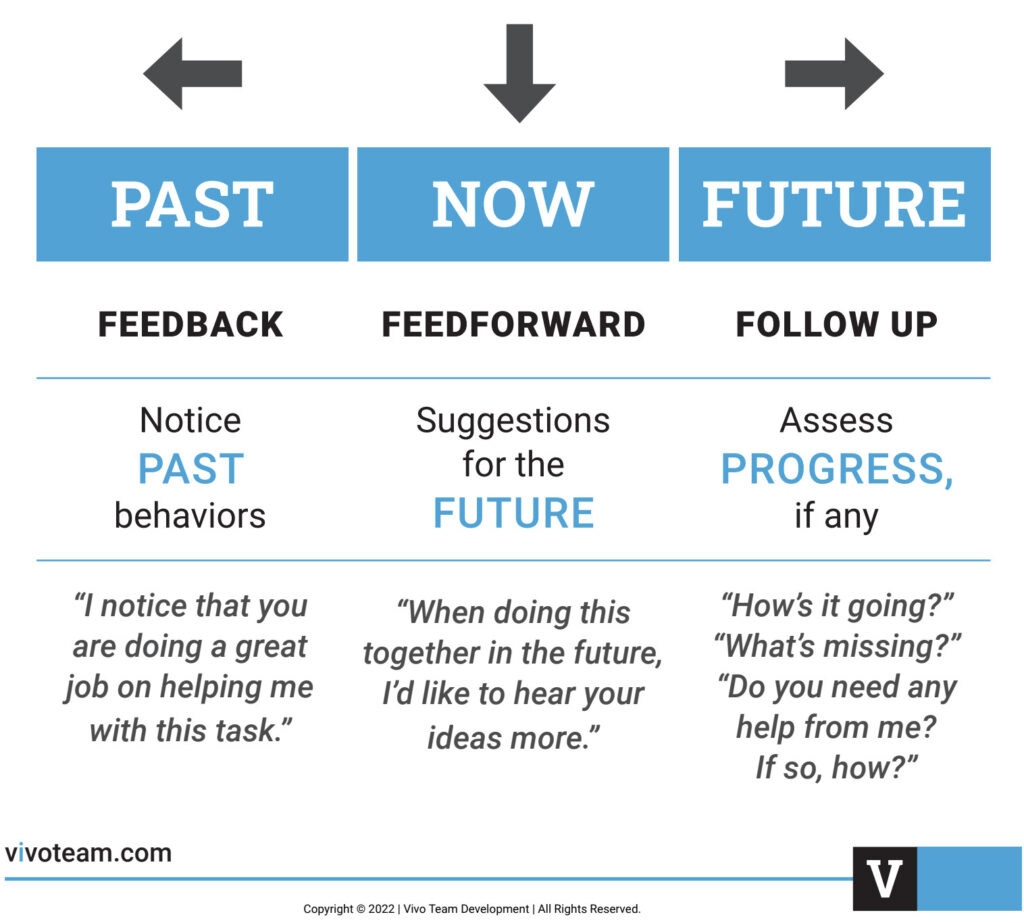Article by Vivo Team.
Tough love in the workplace is a respectful, two-way conversation to help a person or team find better ways of doing things. Harness the power of these three F-words to inspire and engage people to improve their performance: feedback, feedforward, and follow up.

Feedback
Feedback is focused on what has happened in the past and gives us the opportunity to explore and develop the most appropriate solution to prevent a pattern. If delivered poorly, or not all at all, there is a high probability the behavior will be repeated.
Describing a specific behavior is the best starting point for a two-way conversation about an issue in order to find a better way. To ensure you are describing behaviors, and therefore opening the door for a respectful conversation, start your feedback with “I noticed…”
Instead of: What’s the matter with you? You’re always late for meetings.
Try: I notice that you’ve been late for our last three team meetings.
Instead of: You missed another deadline, I feel like I can’t rely on you.
Try: I notice that you missed another deadline.
Instead of: Why don’t you care about this project!?
Try: I notice that you are not following up on your commitments on this project.
Instead of: Great job!
Try: I notice that you delivered that project well and on time.
Starting a feedback conversation by describing the behavior reduces the emotional charge when discussing performance issues or having difficult conversations. People are usually more open to hearing a behavior described than a judgment proclaimed.
Feedforward
Feedforward, a term coined by Marshall Goldsmith, is focused on the now. This is where you very clearly point out to the person specific behaviors that will result in them becoming more effective. What are the best next steps that would lead to the highest probability of improvement?
In feedforward conversations, you should also evaluate if the employee has the appropriate tools—have you set them up for success?
If you provide feedforward without the feedback, there is no foundation to your action plan and it ignores addressing the details. The person receiving the feedforward may not even understand why you are making these suggestions and dismiss them, leading to confusion and unclear direction.
Here are some examples of feedforward:
“When we work on presentations together in the future, I would like to hear your ideas more.”
“When sending meeting invites in the future, please include a link to our shared notes doc.”
“I really liked how you presented the data to the team. Please continue to present it in that way.
Follow Up
Follow up is designed not only to give the opportunity to evaluate the success of the action plan that was implemented, it also shows that you care about your team members personal success. Here are the three areas of follow up that create the most comfortable and lucrative conversations:
What worked and made you feel great about the success you had with it?
What stuck with you? A specific new skill or piece of knowledge that you may have not tried or known if not given to you.
What are you going to leave behind? What didn’t work in the practical implementation of the action plan?
Using the three F-words creates a culture of interactive feedback that provides the most rounded and solution focused approach to performance improvement. These conversations are critical to development, accountability, and cohesion. By avoiding them or letting too much time pass you will miss the opportunity to inspire and engage people to want to do things better.
What to learn more about interactive feedback? Check out this podcast.
Ready to take the next step in your legal career? Our team at ZSA Legal Recruitment specializes in connecting talented legal professionals like you with top-tier opportunities in the legal industry. Let us help you navigate the legal job market and land your dream role. Contact our team today to get started!
